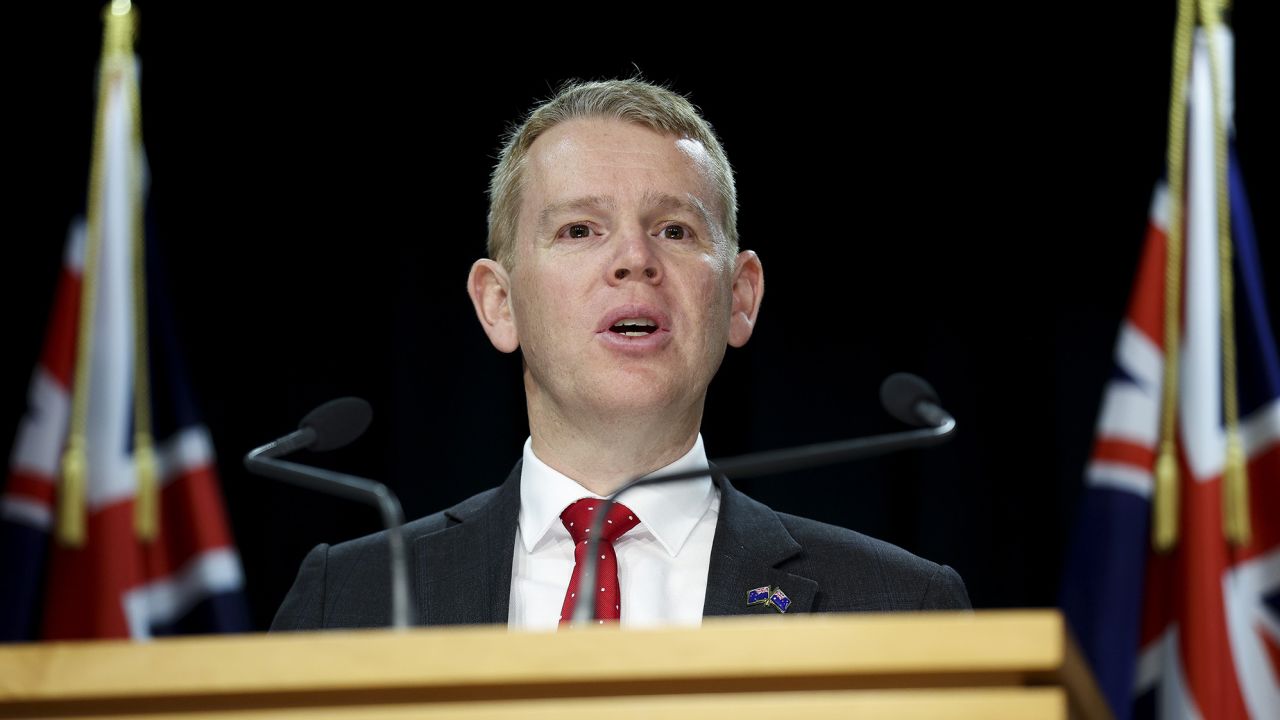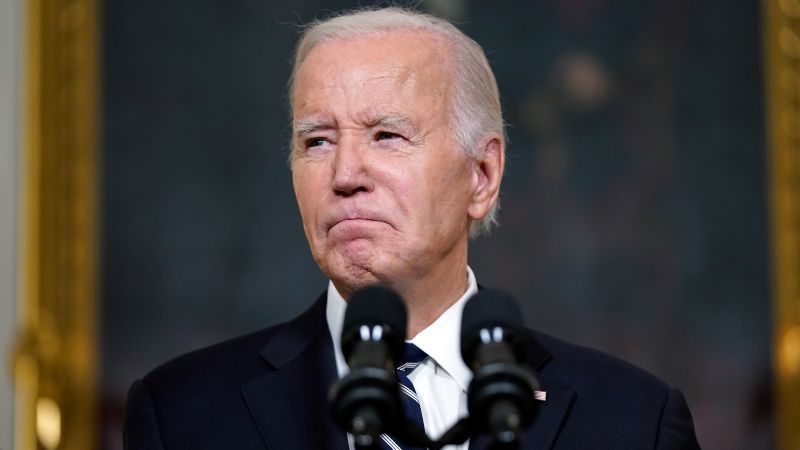CNN
—
House Republicans have picked Ohio Rep. Jim Jordan as their new speaker nominee Friday, but more than 50 Republicans voted against supporting him on the House floor – leaving the party still in disarray as it has been unable to elect a speaker in the 10 days since the historic ouster of Kevin McCarthy.
Jordan sent the conference home for the weekend following Friday’s party votes, and lawmakers said he planned to use the time to speak with his opponents and try to win them over.
Jordan is facing stiff resistance to be elected speaker on the floor thanks to the same math problem that doomed the bid of Majority Leader Steve Scalise, who initially won the GOP speaker nomination but dropped out of the race abruptly Thursday evening after facing a hardened bloc of opposition.
By failing to coalesce behind a candidate, the GOP conference has plunged the House into uncharted territory and effectively frozen the chamber at a time when major international and domestic crises loom, from Israel’s war against Hamas to a potential government shutdown in mid-November.
Jordan or any other Republican speaker candidate can only afford to lose four GOP votes when the House votes for speaker, if all members are voting, because winning a speaker vote requires a majority of the full House.
Jordan’s backers expressed confidence he still could get there, but the Ohio Republican faces a major uphill climb.
The House GOP conference selected Jordan on Friday as its latest speaker-designee in a 124-81 vote over GOP Rep. Austin Scott of Georgia – who made a surprise last-minute bid. Jordan gained only 25 supporters compared to Wednesday’s vote when Scalise defeated Jordan, 113-99.
Jordan then called a second vote asking members if they would support him on the floor, in an effort to see if that could shrink his opposition. That vote, which was cast by secret ballot, was 152-55 – laying bare the long road ahead for Jordan’s speakership bid to succeed.
Jordan has made a name for himself as a staunch ally of Donald Trump and was endorsed by the former president in his bid for the speakership. The Ohio Republican serves as chairman of the powerful House Judiciary Committee.
On his way into an earlier House GOP conference meeting Friday morning, Jordan told CNN’s Manu Raju that he thinks he will be able to get the 217 votes needed to win the gavel, but refused to say if he would drop out if he can’t get there by the end of the day.
“I think we’ll get 217 votes,” Jordan said. “I think we’ll get 217 votes – that’s the quickest way to get unified and get to the floor.”
After Jordan secured his party’s speaker nomination Friday, McCarthy urged the conference to rally around the Ohio Republican, according to multiple lawmakers in the room – a far different tone from when Scalise won the nomination earlier this week.
“He went up and gave a speech and said, ‘Hey, Jim is gonna be our next speaker. So let’s everybody cool off, drop the emotions, lets go, come back Monday and take care of business,’” said one GOP member, who is backing Jordan. “And he went into some of the crises our country is facing.”
After the meeting, McCarthy told CNN that Jordan will “get there,” despite the fact that he fell far short of the votes needed to win the gavel. The former speaker also told CNN earlier that he thinks Jordan should take the speaker fight to the floor even if he doesn’t have the votes locked up yet.Jordan has been meeting and having calls with holdouts as he attempts to lock down the 217 votes he will need to secure the gavel, according to a GOP aide.
The problem for the House GOP is that it’s not clear anyone can lock down the 217 votes needed to win the gavel, raising questions over how and when the standoff over the speakership will last and at what cost. Republicans have been mired down in infighting that has left the House paralyzed with no clear path to elect a new speaker after Kevin McCarthy’s historic ouster.
Tensions are boiling over among House Republicans frustrated at the impasse and concerned over the path forward.
Republican Rep. Mark Alford of Missouri told reporters after Scalise’s exit from the race Thursday evening that one lawmaker had remarked: “‘You know, you could put Jesus Christ up for speaker of the House and he still wouldn’t get 217.’”
Rep. Don Bacon, when asked whether he is a “no” on Jordan, told CNN’s Manu Raju that he’s “chewing on it right now” and said many Republicans are reluctant to reward what they see as “bad behavior” by giving in to what a small group of holdouts have been pushing for, though he said that’s not Jordan’s fault.
“We had five individuals today who said they would only vote for Jim and not Steve. So many of us feel it’s rewarding bad behavior if we do that. The problem for me though is it’s not Jim’s fault so I’m just grappling with that,” he said. “There’s a great quote … if you give a 5-year-old who is misbehaving terribly more ice cream, they will be worse behaving, right? That’s what’s going to happen here if we reward that behavior. So a lot of us are resistant to that.”
McCarthy’s support for Jordan Friday marked a notably different posture than the one he took toward Scalise, his former top deputy who has long been seen as his potential rival. Sources said that the former speaker did not give a speech after Scalise secured his party’s nomination on Wednesday.
In an interview on Fox News Thursday, McCarthy talked about how difficult it was going to be for the House majority leader to prevail and cast doubt on whether Scalise could go as many rounds as he did on the floor in January.
“He’s got an uphill battle to go. His number was much lower coming out of the conference,” McCarthy said of Scalise. “If you take the three delegates out, he didn’t have the majority there. So, it’s going to be difficult for him.”
Scalise’s exit from the race and McCarthy’s historic removal as speaker have put a spotlight on the power of a small faction of conservatives to sideline the agenda of a majority of the conference. House Republicans control just a razor-thin majority and a speaker candidate can only afford to lose four defections and still win.
On Thursday the night before he hopped into challenge Jordan, Scott told CNN the GOP’s inability to elect a new speaker driven by small group of holdouts “makes us look like a bunch of idiots.”
“We’ve got a very small group of people that they have to have everything their way. We had a group that sabotaged Speaker McCarthy and now we’ve had a group that sabotaged Steve Scalise, both of them great people,” he said.
In a reminder of the fundraising prowess that McCarthy brought to the table, which Republicans will now be missing as they look to maintain control of the House in 2024, the ousted speaker’s political team announced Friday that he had raised a record-breaking $78 million for Republicans this cycle.
McHenry remains interim speaker
Before Scalise withdrew, Republicans were already considering whether they should try to expand the powers of interim Speaker Patrick McHenry of North Carolina, so the House can pass legislation, like a resolution for Israel, multiple lawmakers told CNN.
“That is an option that we could pursue,” GOP Rep. Steve Womack of Arkansas told reporters.
A group of more centrist Republicans are circulating a letter asserting that McHenry should have more temporary power, sources told CNN – a sign of desperation as the GOP scrambles to coalesce around a speaker.
Attempting to expand the powers of the interim speaker, a role that is extremely limited, would put House Republicans in untested legal territory though and could be complicated to pull off, and some in the party have already pushed back on the idea.
“I’m not willing to look at that at all,” said Rep. Mario Diaz-Balart, a Republican from Florida.
Jordan has been the face of key House GOP investigations as chair of the Judiciary committee.
The Ohio Republican has served in Congress since 2007 and has a longstanding reputation as a conservative agitator who helped found the hardline House Freedom Caucus.
In addition to chairing the Judiciary Committee, Jordan is also the chair of the select subcommittee on the “weaponization” of the federal government. When McCarthy announced a House GOP impeachment inquiry into President Joe Biden, he said House Oversight Chairman James Comer would lead the effort in coordination with Jordan as Judiciary chair and Ways and Means Chair Jason Smith.
While Republicans say their investigative work is critical to informing the American public and ensuring accountability, Democrats frequently criticize Jordan as a hyper-partisan Trump defender and have accused him of using his perch to shield the former president in the run up to the 2024 presidential election.
As Jordan oversees key House GOP investigations, Democrats also point to the fact that he stonewalled a subpoena for his testimony from the House select committee that investigated the January 6, 2021, attack on the US Capitol.
Jordan as well as Scalise both supported objections to Electoral College results when Congress met to certify Biden’s presidential win on January 6, 2021, the same day a pro-Trump mob attacked the US Capitol seeking to overturn the election.
This story and headline have been updated with additional developments.















